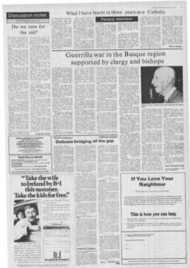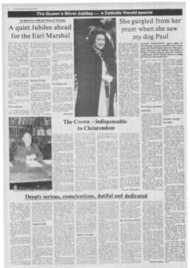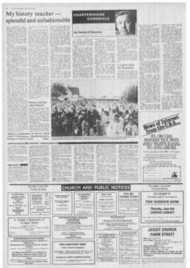Page 3, 3rd June 1977
Page 3

Report an error
Noticed an error on this page?If you've noticed an error in this article please click here to report it.
Tags
Share
Related articles
European Elections
George Ward Replies To Mp On Grunwick
The Cross That's Just Not Adequate
Mp Proposes Priests Run For Commons
N Ireland Peace Talks Plea By Catholic Mp
Election moves in the Republic
Kevin McNamara
IT IS a fundamental mistake about politicians to imagine that they enjoy facing elections. They do not. The larger an MP's majority, the more nervous he becomes as a General Election approaches. Nevertheless politicians, with a malicious glee, do enjoy watching other politicians face their electorate.
I was in the Dail Eireann last week when the Prime Minister, Mr Liam Cosgrave, announced the dissolution of the Dail and the General Election to be held on June 16. In Britain when such announcements are made the first task of a sitting member is to rush to the latest opinion poll. find out the current swing for or against his party, and calculate his chances of survival. In the Republic it is not so easy.
There the problem is bedevilled by proportional representation and the multimember constituencies of 3, 4 or 5 seats. The sitting member not only has to worry about the Opposition parties and swings but about his proposed runningmates on the party ticket.
He hopes that he will retain all his existing first preference votes, but if his running-mate should be young, thrusting, well known, photogenic, there is a real chance that the incumbent's first preferences may transfer to his running-mate. The danger is that while the party might retain the seat, it might well be represented by a new member.
It does not happen often, but the fear is sufficient to have all the sitting members busily calculating whom to have on the party ticket with them, sufficiently strong as a vote-puller to maintain the party share of the poll but not so strong as to replace the sitting member.
When I spoke to Mr Cosgrave shortly before the dissolution he was confident that the Coalition of Fine Gael and he tabour Party would win the election on the basis of being the party that had weathered the -storms of the Western economic recession and the mountainous jump in oil prices. The Irish economy is expanding, exports are high and business confidence is great. Prices and youth unemployment present the main problems. With the weakened Opposition, squabbling Fianna Fail, the coalition has every reason to be confident. If the coalition wins it will be the first time a coalition has retained office in Irish history.
Mr Jack Lynch is equally insistent that Fianna Fail are going to win. He asserts that the coalition is very vulnerable on the two issues of prices and unemployment. Certainly his election manifesto, which promises the abolition of domestic rates, further cuts in income tax and the partial ending of the Road Fund Licence, is very i attractive. Ile discounts that t would be bound in the long run to lead to greater government borrowing or a cut back in social services.
On those issues which are of most importance to the British electorate — security and the Northern Ireland issue — the present government has shown the greatest firmness. Terrorism has been firmly resisted. The coalition's attitude fo the Northern question is to support all attempts made by the British Government to achieve powersharing.
While the position of Fianna Fail on security cannot be challenged, except perhaps at the margins, there is a large question mark over its policy towards the North, Fianna Fail argue that Britain should declare its intention of eventually withdrawing from the Six Counties. This request for a declaration of intent is by its very vagueness extremely dangerous. Fianna Fail argue that if such a declaration was made, the Loyalist politicians in the Six Counties would have to address themselves to coming to terms with a United Ireland. A number of bodies representing the parties in the North, the United Kingdom and the Republic Governments could be established to work with that end in view.
The fact that a vague declaration of intention without a firm date might keep unrest continuously on the boil, prevent power-sharing and maintain a crisis situation in the Six Counties and parts of the Republic, does not seem to have entered into Fianna Fairs calculation.
It is unlikely that either the questions of security or the Six Counties are likely to become election issues. Certainly it is not the intention of the various party leaders to make it so. Should the North become an issue, Fianna Fail will be very much on the defensive and it is likely to be a major weakness in their appeal to the electorate.
Informed opinion in the Republic is that the Coalition Government will be re-elected. I, too, thought that Liverpool was bound to win the FA Cup. While it is one thing to be confident, the coalition candidates could become too complacent. If that happens there will be a change of government in Dublin.
I do not think it will happen, but it is by no means the one horse-race that some supporters of the coalition would seek to imply.
blog comments powered by Disqus











